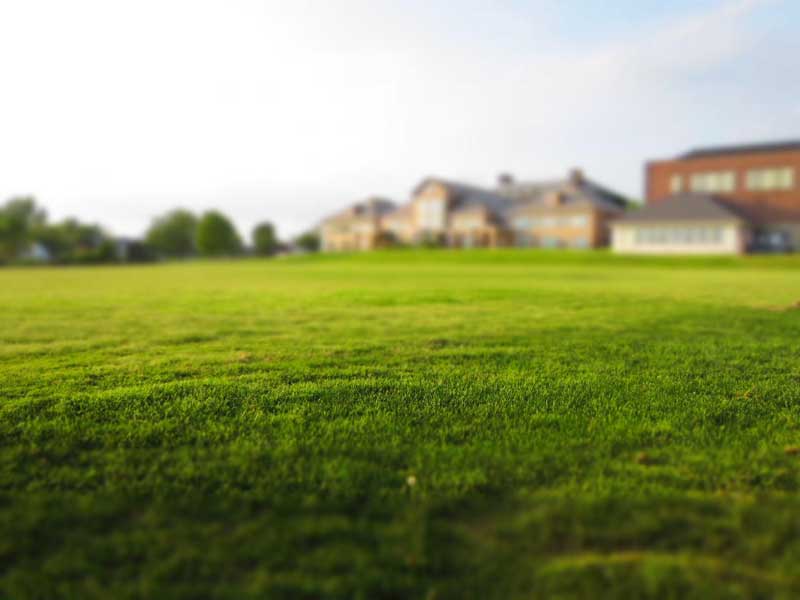The simple answer is Yes, weeds can damage your lawn if left untreated for long periods of time.
Whether you’re dealing with clumps of clover, patches of crabgrass, dandelions or any other type of weed, they can appear out of nowhere and be troublesome to deal with.
The easiest way to prevent weeds growing is to promote a healthy lawn. In this article we will examine the different ways that weeds can damage your lawn and offer you some tips to help deal with them.
Table of Contents
Weeds Can Damage Your Lawn Or Garden In Four Different Ways
Weeds Prevent Grass On Your Lawn Getting Access To Vital Nutrients
To maintain a healthy lawn your grass needs access to nutrients, light and Water to survive. Unfortunately, weeds need the same. Weeds end up battling for space with your grass, unfortunately win if left unattended.
If the weeds on your lawn prevent the grass from getting enough potassium, nitrogen and other nutrients, they’re also more susceptible to insect and disease infestation.
Weeds Take Up Valuable Space
If we leave weeds to grow on your lawn, they will gradually take up the space needed for grass and prevent your lawn from reaching its full potential. If neglected, these weeds will quickly blanket the entire lawn
#3 Weeds Can Be Parasitic
Some types of weeds are too much more than just preventing the grass on your lawn from getting the nutrients in space and needs.
To the roots and stems of healthier plants and drain the nutrients they’re absorbing, this leaves both the soil and the grass open to infestation and disease.
#4 Weeds Are Dangerous To Pets And Humans Too
Weeds not only damage the grass if left alone, they’re all so dangerous to the health of you and your family and your pets.
For example, many people have ragweed allergies that can cause a severe skin infections.
Other weeds such as water hyacinths can affect the quality of the water in your lawn and your home’s water supply.
What Is The Best Way To Keep Weeds Off My Lawn?
Maintaining a healthy lawn takes a lot of work, and the last thing you want to do is to lose it to a crop of weeds
Remove All Existing Weeds
Unless you employ a professional gardener or have the time to maintain your own lawn on a daily basis, so if you need scrubbing up is nearly inevitable.
You should be removed by pulling their roots and all using either a hand elevator or just by hand. If it reaches a stage where these weeds are out of control, you could use a natural herbicide that can easily apply to the entire lawn.
We recommend that you always follow the application instructions provided by the manufacturer. It’s vital that he correct the identify the weeds that you’re trying to tackle and apply a product that’s designed to attack the specific weed otherwise it may prove useless.
Your Lawn Will Need To Be Detatched
That is the term used to describe the organic material that can accumulate and Matt on top of the soil of your lawn.
If you left in place, let’s call patches of your lawn to die and these open spaces are just invitations for weeds to grow.
If you have over 1 inch of that turn your lawn it’s time to contact a professional and they will employ either a powered detacher or attaching rake to remove the excess the resulting long unfortunately will look terrible but it’ll quickly recover in under a month.
Your Lawns Soil Needs Air
Weeds can quickly take hold on alone that is overly compacted. Removing a square foot of your lawn will allow you to examine the roots if they don’t go over 2 inches deep and long and then it’s overly compacted and employ an aerator.
A contractor will use a cooling machine which will allow them to bore holes in your lawn and apply in overlay of sand and compost to aerate it.
Over Seed Any Bare Spots
If you see any bare patches on your lawn in early fall or spring, we advise you over seed it using Kentucky bluegrass, fescue or rye.
If it’s during a warmer season, Bermuda grass is probably more advisable.
Using a broad seeds better if I allow you to apply it even application of long seeds and then help them quickly establish.
Getting Your Mowing Schedule Correct
Dense healthy lawns are more resistant to weeds. To ensure this happens, you should only ever remove the top third of the grass on your lawn.
By doing this regularly and setting the height of your more correctly, you’ll help quickly cast shade on any weed seeds preventing them from even germinating to begin with.
Feeding And Watering You Lawn Is Important
Like any plant needs food and water, especially during periods of drought or heat. Apply an appropriate fertilizer periodically during the year and ensure that you water your lawn when needed.
#6 Mulching Helps Bare Areas
Bare patches of soil offered a perfect place for roots to establish. If you have open patches of soil near your lawn, we advise spreading mulch over this as it would prevent weed growth and also work against soil erosion.
#7 Try Not To Till The Soil Of Your Lawn
If you recognize a weed problem immediately stop telling any soil in your garden as all you’re doing is helping the weeds by doing the work for them.
If there’s weed seeds near the surface of your soil and all you are doing is moving them deeper into the soil and helping to establish.Maintaining weed free lawns proves the challenge for both homeowners and business owners around the world.
Working with professionals can help you keep your lawn healthy and look your best all year round. Working with trained professionals is by far the best way to maintain your lawn and keep it weed free.

